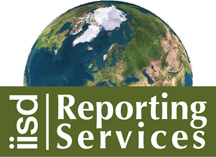News * Abou us * the ENB team * DONATE * Activities * Search * IISD RS home * IISD.org * RSS * What is RSS? * Links |
|
MEA Bulletin
1 March 2006 UNEP’s programme for climate change outreach By Michael Williams and Arkadiy Levintanus, UNEP’s Division on Environmental Conventions The United Nations Framework Convention on Climate Change (and its Kyoto Protocol) can only succeed with the support of the public and of key interest groups. Governments cannot implement it unilaterally in the same way as, for example, a trade or security treaty. Since governments are directly responsible for only a small proportion of greenhouse gas emissions, they must persuade businesses, communities, and individuals to adjust their activities in order to limit emissions and promote adaptation. Otherwise, it will be impossible to realize the Convention’s objective. The UNFCCC recognizes this reality: under Article 6 on Education, Training and Public Awareness, it calls on governments to promote the development and implementation of public awareness activities and requests intergovernmental organizations to continue supporting these efforts through their regular programmes. In 2002, the New Delhi COP gave a new impulse to those efforts by adopting a five-year Programme of Work on Article 6 outlining specific interventions and activities. UNEP has been supporting work on Article 6 for over 10 years. Today its Article 6 programme, which benefits from financial support provided by the Government of Norway and other donors, has four priorities. These are: 1 – Building national and regional outreach programmesUNEP is supporting a growing number of governments committed to launching their own Article 6 outreach programmes. These national projects start by conducting a needs assessment, building a domestic network of interested stakeholders and then initiating priority activities. Other governments are receiving support to expand or strengthen activities under already existing national outreach programmes. In Africa, UNEP has assisted Ghana, Kenya and Namibia with the implementation of their Article 6 projects. These projects have resulted in the adoption of draft National Climate Awareness Plans. Other outputs have included publications in local languages, radio programmes and seminars. Follow-up projects are under way or envisaged in Kenya and Namibia, together with a new project in the Gambia. In Asia, Uzbekistan has established a national climate information network, compiled training guides for students and teachers and organized numerous workshops and seminars for various target groups. Follow-up projects for that country will focus on compiling and disseminating information and training materials in local languages. Cambodia has started work on establishing an outreach capacity while Kazakhstan, Kyrgyzstan, Tajikistan and Turkmenistan are working together to produce a climate change curriculum for universities and other institutes of higher education. Several countries in Europe with economies in transition have made impressive advances. Albania and Georgia have conducted needs assessments and are preparing for stakeholder workshops. Russia has completed its initial climate awareness programme by producing a climate change curriculum for universities, training guides for businessmen and a children’s competition on climate change research. It is now finalizing the second stage with a guidebook for decision-makers and a high-level workshop on climate awareness. Armenia is preparing for a needs assessment to be followed by a stakeholder workshop. The countries of Latin America have decided to take a regional approach. A Handbook on Climate Change Communication Planning for Latin American practitioners has been prepared and tested at a workshop on training and mentoring attended by representatives from 10 countries of the region. 2 – Reaching out to key target groupsUNEP’s project with India’s Tata Energy Research Institute (TERI) aims to promote climate change awareness among youth. One hundred schools in eight Indian states are forming climate clubs, organizing sensitization workshops and seminars, developing a climate change logo, writing essays and competing in quizzes. UNEP is also entering into a partnership with Scouts Canada and the South African Scout Association to develop a climate change action programme for youth associations in Sub-Saharan Africa to be replicated later in other regions UNEP is also training journalists from developing countries to help them improve and expand their climate change coverage. A three-day workshop for 20 journalists from 13 Anglophone African countries was held at UNEP headquarters in Nairobi in 2004. UNEP has also sponsored the participation of four African journalists at COP11/MOP1 in Montreal. Another project started recently involves journalists from Georgia in a media tour and workshop focusing on climate change issues relevant for the country 3 – Promoting the findings of the IPCCThe information and messages contained in the IPCC reports deserve the widest possible dissemination. UNEP therefore actively promotes the use of IPCC information through the press, fact sheets and simplified guides and outreach seminars. Most recently, in 2004, UNEP published an updated edition of its Vital Climate Graphics based on the IPCC Third Assessment Report. It also published a special set of Vital Climate Graphics for Latin America with data from the IPCC and from the National Communications from the region. During early 2006 UNEP will publish simplified guides to the 2005 Special Reports on Carbon Capture and Storage and on HFCS. 4 – Supporting the Article 6 processUNEP has established a partnership on Article 6 with the Secretariat of the Climate Change Convention and maintains regular contacts on the progress and implementation of its climate outreach programme. In addition to organizing side events at Convention meetings, it has provided financial and logistical support to the regional workshops requested by the Parties. These have included the Banjul workshop for Africa in February 2004, the Montevideo workshop for Latin America and the Caribbean in March/April 2005, and the Yokohama workshop for Asia and the Pacific in September 2005. UNEP also convened a similar though unofficial workshop in Moscow on March 2004 for the member countries of the Commonwealth of Independent States.
Other support activities to
be carried out in 2006 include the production of a
booklet of best practices and contributions to the
Secretariat’s work on developing an Article 6 Clearing
House |

